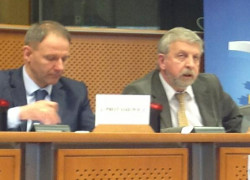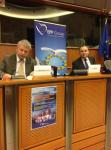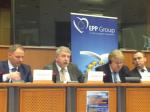Milinkevich calls on EU to lift sanctions from Lukashenka
233- 10.04.2013, 0:36

Representatives of the European Parliament were trying to convince the Belarusian opposition at a conference in Brussels that a dialogue with the government was necessary.
Organisers didn't suppose the conference, which was held on April 9 in Brussels, would attract so much attention. Read Radio Svaboda's coverage of the event below.
The increased interest was provoked by the statements published on the internet ahead of the conference – a declaration of three opposition politicians and a reply of Andrei Sannikov, a coordinator of European Belarus civil campaign, candidate for presidency in the 2010 elections and former political prisoner.
The main question that again split the opposition is whether a dialogue with the regime is needed.
The conference was titled “The Dialogue on Modernisation with Belarusian Society”, but MEPs and Belarusian civil society representatives spoke on a wider range of matters.
The room was nearly full to capacity and the Belarusian language was heard in corridors of the EP building. Besides the invited guests, the event was attended by Belarusian students from Warsaw, representatives of Belarusian emigrants, analysts and journalists.
Polish MEP and Chairman of the EP Delegation for relations with Belarus Filip Koczmarek, the organiser of the conference, welcomed the participants. He proposed to analyse the results and talk about the future of the European Dialogue on Modernisation with Belarusian society, the project launched last March.
Under Secretary of State at the Polish MFA, Jerzy Pomianowski noted the authorities did not demonstrate intentions to the dialogue on modernisation, but some significant changes had happened in Belarusian society. According to Pomianowski, the authorities do not understand that “modernisation does not mean painting the fence”.
Vice President of the European Parliament Jacek Protasiewicz noted the dialogue was necessary and recalled the experience of the Polish Solidarity movement. According to him, cooperation with the elite on a local level was necessary. These contacts and experience will be useful in the period of transformations that will began sooner or later, he says.
Elmar Brok, the Chairman of the Foreign Affairs Committee of the EP, stressed that the problem of effectiveness of the Dialogue on Modernisation was not in increasing financial aid, but in how the money is used. He was sceptical about the Eastern Partnership summit scheduled for autumn in Vilnius.
Aliaksandr Milinkevich, the leader of the Movement For Freedom, supported the dialogue between the EU and the regime, because, as he thinks, it “will distract Belarus from Russia”. The politician said the liberalisation of 2009-2010 was successful and that “the Russian secret services were involved” in the provocations during the post-election protests on December 19, 2010. Milinkevich called on the EU to lift sanctions.
Gunnar Wiegand, the Director for Russia, Eastern Partnership, Central Asia, Regional Cooperation and OSCE, European External Action Service, said Stefan Fule and Uladzimir Makei agreed at a meeting in Tbilisi that Belarus would join the Dialogue on Modernisation. He gave to understand that the dialogue with the government would be held in parallel with the dialogue with civil society.
Aliaksandr Autushka-Sikorski, a coordinator of the Dialogue on Modernisation's Working Group on Economic, Social and Sector Policy Issues, presented a series of slides with analysis and assessment of the project's effectiveness. According to him, 95% of Belarusians didn't hear about the Dialogue. He said the so called “second road” of the Dialogue with participation of the Belarusian government would be opened.
Belarusian participants split over the possible dialogue with the authorities. Human rights activist Valiantin Stefanovich remarked that one should not hope for many steps by the authorities. “If there is modernisation, it will be an authoritarian modernisation, without democratisation of society,” he said.
Anatol Liabedzka criticised the idea of the dialogue with the government without participation of civil society:
“We still have three conditions: the release and rehabilitation of political prisoners, holding free and transparent elections and a dialogue on modernisation. Only this order is possible, no other way.”
One cannot say who had stronger arguments. No decisions or resolutions were adopted at the conference. By all appearances, the Dialogue on Modernisation will be continued.
Time will show whether an attempt to involve the Belarusian government in the process will be successful.











